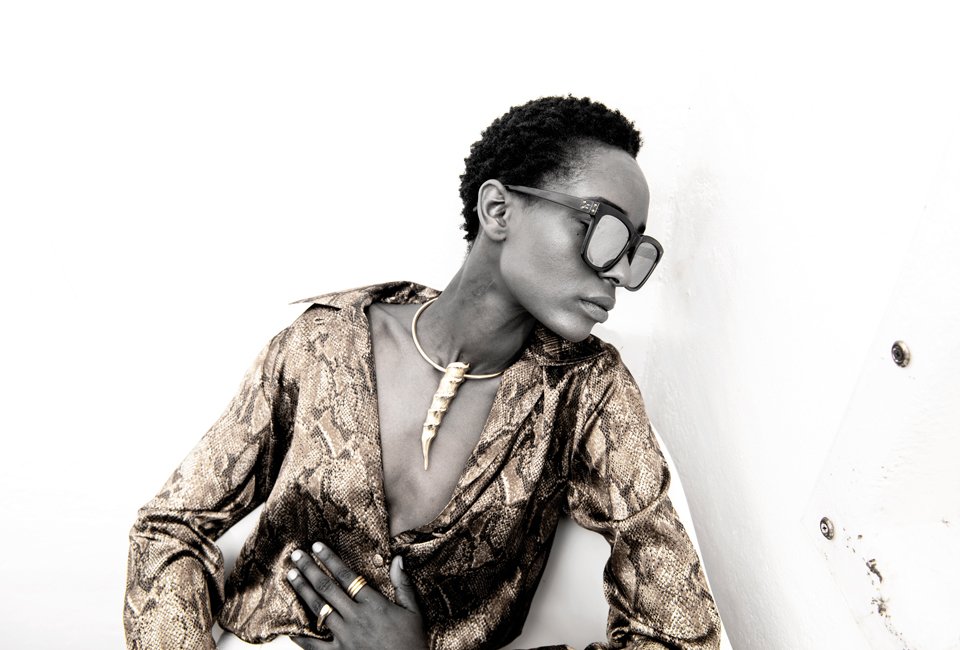Adele Dejak is an established jewellery and fashion accessories brand based in Nairobi, Kenya. Designed and handmade using reclaimed and recycled materials from across Africa, this affordable luxury brand has piqued the interest of fashion and style icons worldwide.
Anglo-Nigerian Founder and Designer, Adele Dejak, first established the label under the brand name Magik Grace Art & Design Limited in 2008 in memory of her mother and out of a love for fashion accessories. Growing up in Nigeria, Adele shared a unique bond with her maternal grandmother over a love for beads and accessories. So much so that she would save all her pocket money to buy necklaces, bracelets, amulets and wallets at markets in Kano and Kaduna, Nigeria. This love soon became a passionate business venture for Adele.
Running a jewellery business in a foreign country however was not like making beads with her grandmother. When Adele relocated to Kenya around 2005, she had been making pieces for herself when her talents were spotted. People really loved her designs, which gave her the courage to finally kick-start the brand. She started by testing the local market in Kenya before opening a shop in Nairobi.
Now, a decade later, Adele has a strong presence in popular hotels and shopping malls in Kenya and has become a leading, yet affordable handmade-in-Africa luxury brand. Years of positive feedback have allowed her to continuously improve and reinvent Adele Dejak.
With a flagship store at the Village Market Mall in Nairobi and a workshop and showroom in Kiambu, on the outskirts of the city, Adele has refocused her energies on generating merchandise for export. Although the brand still sells locally through hotels and lodges.
Creating a strong brand image has been key in differentiating Adele Dejak from its competitors in an industry where identity is taken very seriously. With the tagline “Discover African Luxury” Adele launched an exclusive luxury line, featuring products of the highest quality in terms of finishing and branding for the top end of the market.
Her inspirational designs begin with research on shapes and textiles from photos, artwork, books and magazines on African tribes. Her designs are also very much influenced by the environment – both people and nature. As Creative Director, Adele drafts the sketches and designs, working closely with her team to bring the ideas to life. Adele Dejak designs makes a bold statement for confident individuals who have a love of African luxury.
Ultimately, Adele is inspired by materials. Adele Dejak’s designs integrate locally sourced materials and traditional designs with a modern European style. She acquired these styles growing up and studying in the UK, along with seven years spent in Italy. Adele’s Nigerian roots merge easily with her European influences and with time the two styles have produced several celebrated collections that make up the current brand aesthetic.

For the people and the planet
Sustainability is the driving force behind her choice of the materials used, ensuring that at least 99% are recycled. Adele has broadened her definition of “cost” from a purely financial concept to include the social, economic and environmental costs of running a successful business.
At the epicentre of the brand are thoughtful and intricate handcraft skills, that emphasise the nuances of pattern placement and textuality. The brand prides itself on working with the best artisans – those with the skills and experience to work with materials in the most innovative and creative ways. Adele aims to work with more groups of artisans in and around Nairobi who supply both materials and finished products for the brand. This is guided by the brand’s ethos of growing and empowering local communities while remaining sensitive to the local environment.
The artisans who create the accessories work closely with local communities, including women weaver groups in Maai Mahiu in Kenya and artisans in Uganda. Adele is keen to create job opportunities and additional income by investing in communities in East Africa; by training people in new skills to enhance their livelihoods, the brand is having positive impact on the local and global community. Projects have been started in Kenya and others are ongoing in Uganda, where Adele and her team travel beyond Nairobi to meet with and teach people skills for production. Products are then sold in her outlets and profits are fed back into the local communities where they were made. Adele has worked with UNHCR on a refugee project in Dadaab and Kakuma refugee camps.
Currently, she is working with the UNHCR Made51 project, partnering a social enterprise where refugees’ traditional handcraft skills are harnessed to provide a sustainable development for their future.
Further information

